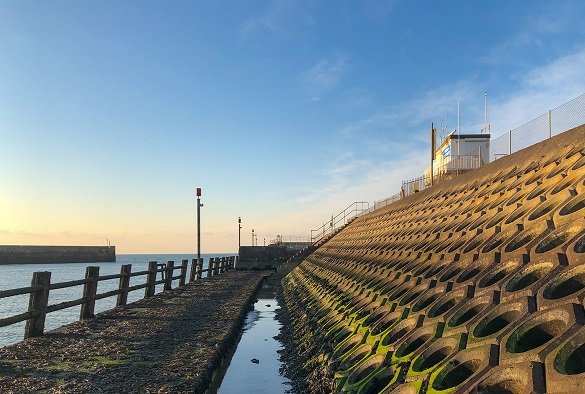Researchers from the University of Liverpool are collaborating with industrial partners to develop the next generation of ultra-low carbon and resilient materials to decarbonise the construction sector.
Dr Luigi Di-Sarno and Adam Mannis from the School of Engineering are teaming up with leading concrete manufacturer JP Concrete and Sensicon, a smart construction products provider based at Sensor City in Liverpool, to design nature-based solutions for low-carbon concrete.
Concrete is the most widely used man-made material on Earth but is a major emitter of carbon dioxide,. It is estimated the cement industry contributies 7% of all CO2 emissions worldwide. For the UK to meet its net zero targets by 2050, carbon emissions from concrete and the construction industry need to be drastically reduced.
The project entitled BIOCOREWALLS (BIO-COncrete for REsilient and Green WALLS for infrastructure) is supported by the University’s Partnership Recovery and Resilience Fund.
Dr Luigi Di-Sarno, Senior Lecturer in Structural Design at the University of Liverpool, said, “The BIOCOREWALLS project is exploring new concrete manufacturing methods to allow the material to be less intrusive using approaches that take their inspiration from nature, such as biomimicry. The latter approaches are vital for enhancing resilience and sustainability of new and existing ageing infrastructure”
Working with the University, JP Concrete are developing ultra-low carbon concrete mixes that are highly durable in any environment and can be used in pre-cast concrete units. Due to their unique concrete properties, these products not only increase the lifecycle of structures but also self-heal to fill cracks in concrete that might occur over time.
Vighnesh Daas, Director – Innovation & Sustainable Construction at JP Concrete, said: “This academic-industry collaboration addresses the needs of clients and businesses in the construction sector for innovative nature-based solutions to mitigate climate change effects. Project outcomes from within the North West will contribute to net-zero carbon targets and business expansion across the country.”
The BIOCOREWALLS project builds on recent joint research between the University and JP Concrete on low-carbon and resilient materials for implementation in new and ageing infrastructure.
The Resilient and Sustainable Infrastructure research group, based within the University’s Department of Civil Engineering, founded and led by Dr. Luigi Di Sarno, is responding to a growing market identified by JP Concrete which also aligns with the UK’s Industrial Strategy and the UN Sustainable Development Goals.
For further information on how industry can collaborate with the University please visit this webpage.
